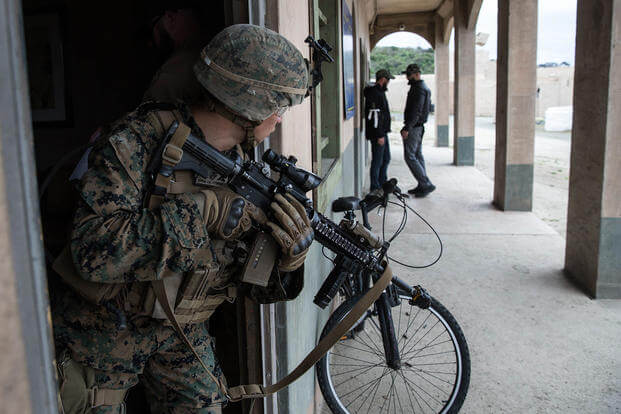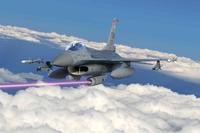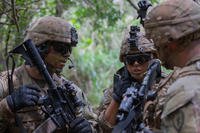The Marine Corps needs more counterintelligence and human intelligence specialists, also known as CI/HUMINT, and is offering some Marines thousands of dollars in bonuses to transfer into those jobs.
The service has labeled the military occupational specialty, or MOS, as "high-demand, low-density," adding that "the need for qualified Marines to lateral move to this MOS will remain high for the foreseeable future," according to an official administrative message posted in late April.
The effort is aimed at recruiting current corporals, sergeants or staff sergeants from any other Marine Corps job. Lance corporals and gunnery sergeants can also apply, but must be "determined exceptionally qualified" for the role based on the screening process, according to the message.
Read Next: Temporary Promotions for Army Noncommissioned Officers to End in June
CI/HUMINT specialists conduct "sensitive and complex" intelligence operations in support of Marine units, like the Marine Air-Ground Task Force, or MAGTF, around the world, according to the message.
The job is difficult and selective, according to the Corps, which has helped create an environment where those skills are highly sought after, hence the bonuses and "high-demand, low-density" label.
"That means there's a lot of appetite for our skill set," a senior Marine in the field, who agreed to speak on the condition of anonymity, told Military.com on Thursday. "We just don't have the people to do it."
CI/HUMINT jobs saw significant importance during the Global War on Terror for targeting and information-collecting missions -- and according to the Corps, they are still critically needed for its current and future efforts.
"The wars in the Middle East were primarily focused on the human intelligence side, meaning we were collecting information and targeting the adversary kinetically," the Marine said.
They said those missions included Marines being on the ground in places such as Iraq and Afghanistan, talking to sources to collect information about the enemy. Now, as the greater defense apparatus focuses on so-called near-peer adversaries, those jobs are still important but are shifting.
"The priority is China. It doesn't matter what theater you're in, it's still China," the Marine said, adding that Russia, Iran and North Korea are major threats that the CI/HUMINT field is tracking too.
"We have a whole other side," they said, referring to counterintelligence that helps protect information, people and critical systems against foreign espionage and attacks. "It's not as sexy as HUMINT. You don't get instant gratification by doing good counter-intelligence," but it is still critical, they said.
The message said that Marines who accept this role will identify threats posed by hostile intelligence organizations, including those "engaged in terrorism, espionage, sabotage or subversion."
Transfer Bonuses Available
The job still involves information collection, including during interrogations and screening. Marines who accept this billet could find themselves assigned to organizations such as the Marine Corps’ Fleet Marine Force, Marine Forces Special Operations Command, Defense Intelligence Agency, Naval Criminal Investigative Service and "other unique billets," the message said.
"It doesn't matter where you end up, whether it's ... North Carolina, California, Okinawa or any of these places," the Marine said. "China is expansive all around the globe, and the work that [counterintelligence/HUMINT specialists] will do right now is going to shape a future war."
"That would be my selling point," they said. "Everywhere they go, they will be shaping the next war."
The Marine Corps has added incentives to the proposed transfer, to include what it calls a "substantial" retention bonus. For example, an active-duty sergeant who transfers into the CI/HUMINT role and agrees to serve the Corps for an additional six years will get a $65,000 MOS-specific bonus and a $40,000 "kicker," for a total of $105,000.
The pay incentives work on a sliding scale based on rank, with more junior Marines earning more in bonuses if they transfer, according to information provided by the service’s Manpower and Reserve Affairs division.
"CI/HUMINT Marines are highly qualified individuals who must pass an intensive screening and training regimen before they earn the 0211 military occupational specialty," said Capt. Sarah Eason, a spokesperson for the division. "As such, it's often a lengthy and difficult process to find qualified applicants that meet the prerequisites."
The Screening Process
That screening process includes ensuring that Marines are meeting and exceeding regular service standards. But the CI/HUMINT accession involves interviews, physical tests, geography and mapping assessments, security clearance prerequisites and written work, to name a few criteria.
A big attribute in the field, the Marine said, is screeners looking at how well the service member will operate under pressure for a role that could lead them to speaking with generals, politicians and embassy personnel, for example.
And that is before the schooling process, which is difficult itself, even begins.
"We have one of the highest attrition rates of any school, probably in the Department of Defense," the senior Marine said, referring to the MAGTF CI/HUMINT course in Virginia. Those who make it through the school will go to their line units, where they will receive further molding by their direct leadership to "make them better and fit into a team," depending on their unit's specific mission, the Marine added.
They urged others looking to transfer into this skill to take a hard look at themselves, especially their personal lives, before committing to that highly sought-after job.
"I would really dig into their personal lives, whether it's [that they] just had children, they just got married, they have financial issues -- anything that could take their mind off of what they could potentially be doing is what I would personally look into,” the Marine said.
Marines interested in the job can reach out to a CI/HUMINT recruiter.
Related: Marine General Issues 'Call to Action' Against China Hackers Lurking in US Computer Systems













